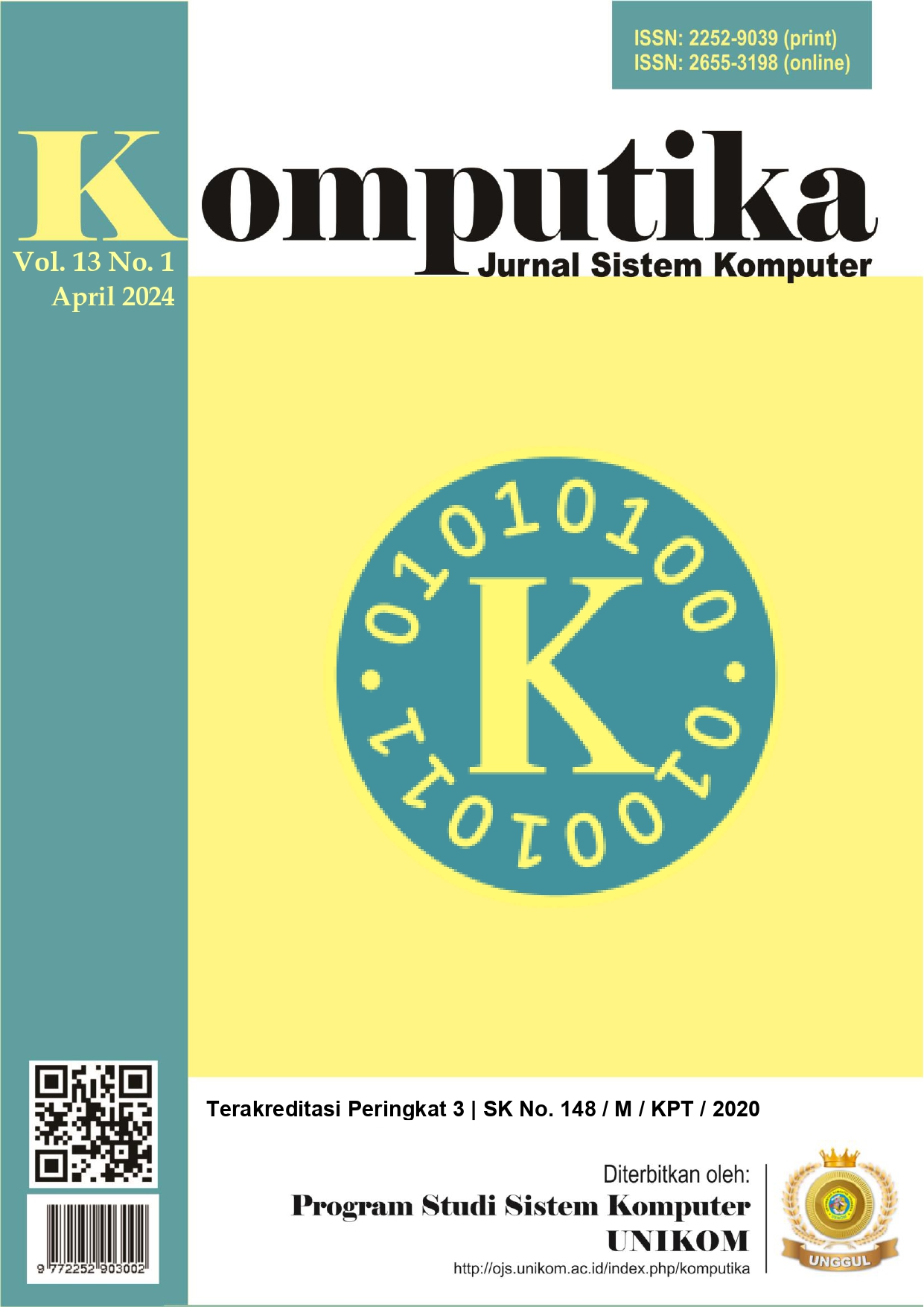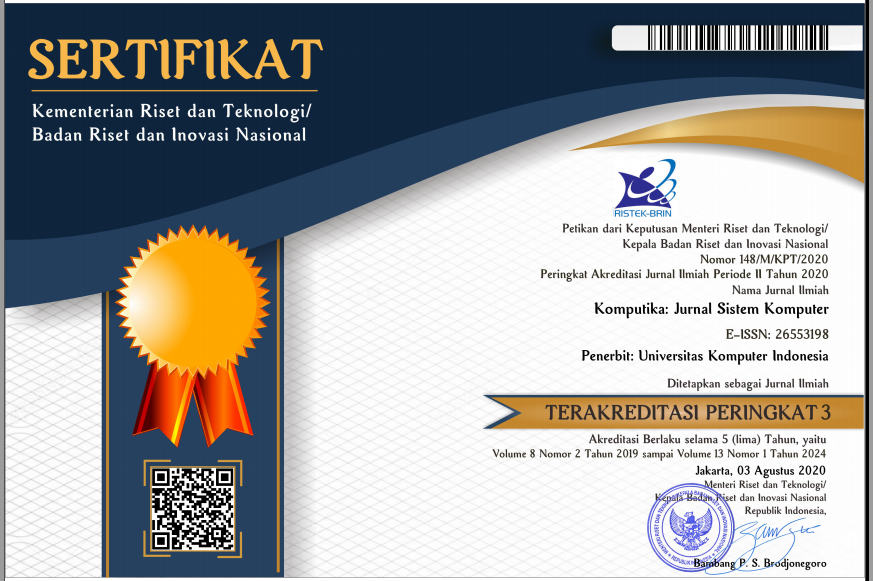Investigasi Model Machine Learning Terbaik untuk Memprediksi Kemampuan Penghambatan Korosi oleh Senyawa Benzimidazole
DOI:
https://doi.org/10.34010/komputika.v13i1.11048Abstract
This research aims to investigate the corrosion inhibition performance of Benzimidazole compounds using a machine learning (ML) approach. The main challenge in developing ML is to obtain a model with high accuracy so that the prediction results are relevant and accurate to the actual properties of a material. In this research, we evaluate various linear and non-linear algorithms to obtain the best model. Based on the coefficient of determination (R2) and root mean square error (RMSE) metrics, it was found that the AdaBoost Regressor (ADA) model was the model with the best predictive performance in predicting the corrosion inhibition performance of benzimidazole compounds. This approach offers a new perspective on the ability of ML models to predict effective corrosion inhibitors.
References
M. Akrom, A. G. Saputro, A. L. Maulana, A. Ramelan, A. Nuruddin, S. Rustad, and H. K. Dipojono, "DFT and microkinetic investigation of oxygen reduction reaction on corrosion inhibition mechanism of iron surface by Syzygium Aromaticum extract," Applied Surface Science, vol. 615, p. 156319, 2023. [Online]. Available: https://doi.org/10.1016/j.apsusc.2022.156319.
M. Sugeng, F. M. Ismail, and J. P. Utomo, "Analysis of differences in corrosion rates from weight loss and polarization on pipe with ASTM G59 and ASTM G31 Standard Corrosion Testing," Tera Journal, vol. 2, no. 1, 2022.
S. Budi, M. Akrom, G. A. Trisnapradika, T. Sutojo, and W. A. E. Prabowo, “Optimization of Polynomial Functions on the NuSVR Algorithm Based on Machine Learning: Case Studies on Regression Datasets” Scientific Journal of Informatics, vol. 10, no. 2, 2023. [Online]. Available: https://doi.org/10.15294/sji.v10i2.43929.
M. Akrom, “DFT Investigation of Syzygium Aromaticum and Nicotiana Tabacum Extracts as Corrosion Inhibitor," Science Tech: Jurnal Ilmu Pengetahuan dan Teknologi, vol. 8, no. 1, p. 42, 2022. [Online]. Available: https://doi.org/10.30738/st.vol8.no1.a11775.
M. Akrom, "Investigation of Natural Extract as Green Corrosion Inhibitors In Steel Using Density Functional Theory," Jurnal Teori dan Aplikasi Fisika, vol. 10, no. 1, 2022.
A. A. Rosidah, V. A. Setyowati, and M. Choir, " Effect of Current and Coating Time on the Layer Thickness and Corrosion Rate of Electroplated AISI 1045," SPECTA Journal of Technology, vol. 5, no. 1, 2021.
R. Napitupulu, J. Daely, R. Manurung, and C. Manurung, "Effect of chrom electroplating time on low carbon steel on hardness, corrosion rate, and layer thickness," Citra Science Technology, vol. 1, no. 2, 2022. [Online]. Available: doi: 10.2421/cisat.v1i2.38.
A. Husodo, "Optimizing the painting process on ship decks to slow down corrosion," JPB: Jurnal Patria Bahari, vol. 3, no. 1, 2023. [Online]. Available: https://doi.org/10.54017/jpb.v3i1.76.
M. Akrom, " Experimental Investigation of Natural Plant Extracts as A Green Corrosion Inhibitor in Steel," Journal of Renewable Energy and Mechanics, vol. 5, no. 1, p 1-15, 2022. [Online]. Available: https://doi.org/10.25299/rem.2022.vol5.no01.8887.
S. Maharani, N. Y. Haryono, and B.D. Mariana, "Analysis of the Effect of Concentration of Benomil Fungicide on Sterilization of Tawangmangu Citrus Plant Stem Tissue Culture," Proceedings of Life and Applied Sciences, vol. 1, 2022.
N. V. Putranto, M. Akrom, and G. A. Trisnapradika, "Implementasi Fungsi Polinomial pada Algoritma Gradient Boosting Regressor: Studi Regresi pada Dataset Obat-Obatan Kadaluarsa Sebagai Material Antikorosi," Techno.com, vol. 9, no. 2, p. 172, 2023.
I. Panduwiguna, I. Hardiana, S. A. Ogiuma, and M.S. Latief, "Gerd Disease Prescribing Patterns In The Inpatition Installation Of XYZ Hospital Jakarta," KRYONAUT PHARMACY JOURNAL, vol. 2, no. 1, 2023. [Online]. Available: https://doi.org/10.59969/jfk.v2i1.21.
M. Akrom, S. Rustad, and H. K. Dipojono, "Machine learning investigation to predict corrosion inhibition capacity of new amino acid compounds as corrosion inhibitors," Results in Chemistry, vol. 6, p. 101126, 2023. [Online]. Available: https://doi.org/10.1016/j.rechem.2023.101126.
M. A. Quraishi, D.S. Chauhan, and V.S. Saji, “Heterocyclic biomolecules as green corrosion inhibitors,” Journal of Molecular Liquids, vol. 341, p. 117265, 2021. [Online]. Available: https:// doi: 10.1016/j.molliq.2021.117265.
D. Prasad, R. Singh, Z. Safi, N. Wazzan, and L. Guo, “De-scaling, experimental, DFT, and MD-simulation studies of unwanted growing plant as natural corrosion inhibitor for SS-410 in acid medium,” Colloids and Surfaces A: Physicochemical and Engineering Aspects, vol. 649, p. 129333, 2022. [Online]. Available: https://doi.org/ 10.1016/j.colsurfa.2022.129333.
M. Akrom, U. Sudibyo, A. W. Kurniawan, N. A. Setiyanto, A. Pertiwi, A. N. Safitri, N. Hidayat, H. Al Azies, W. Herowati, "QSPR-Based Artificial Intelligence in the Study of Corrosion Inhibitors," JoMMiT : Journal of Multi Media and IT, vol. 7, no. 1, p. 015–020, 2023. [Online]. Available: https://doi.org/10.46961/jommit.v7i1.721.
L. Li, X. Zhang, S. Gong, H. Zhao, Y. Bai, Q. Li, and L. Ji, “The discussion of descriptors for the QSAR model and molecular dynamics simulation of benzimidazole derivatives as corrosion inhibitors,” Corrosion Science, vol. 99, p. 76–88, 2015. [Online]. Available: https://doi.org/ 10.1016/j.corsci.2015.06.003.
M. Akrom and T. Sutojo, “Investigation of QSPR-Based Machine Learning Models in Pyrimidine Corrosion Inhibitors,” Eksergi, vol. 20, no. 2, 2023, doi: 10.31315/e.v20i2.9864.
D. Leni, Y. P. Kusuma, R. Sumiati, Muchlisinalahuddin, and Adriansyah, "Comparison of Machine Learning Algorithms for Predicting Mechanical Properties of Low Alloy Steel," Journal of Materials, Manufacturing, and Energy Engineering, vol. 5, no. 2, 2022. [Online]. Available: https://doi.org/10.30596/rmme.v5i2.11407.
M. Akrom, S. Rustad, A. G. Saputro, and H. K. Dipojono, “Data-driven investigation to model the corrosion inhibition efficiency of pyrimidine-pyrazole hybrid corrosion inhibitors,” Computational and Theoretical Chemistry, vol. 1229, p. 114307, 2023. [Online]. Available: https://doi.org /10.1016/j.comptc.2023.114307.
C. Beltran-Perez, A. A. A. Serrano, G. SOlis-Rosas, A. Martinez-Jimenez, R. Orozco-Cruz, A. Esponoza-Vazquez, and A. Miralrio, “A General Use QSAR-ARX Model to Predict the Corrosion Inhibition Efficiency of Drugs in Terms of Quantum Mechanical Descriptors and Experimental Comparison for Lidocaine,” International Journal of Molecular Sciences, vol. 23, no. 9, 2022. [Online]. Available: https://doi.org/10.3390/ijms23095086.
A. H. Alamri and N. Alhazmi, "Development of data driven machine learning models for the prediction and design of pyrimidine corrosion inhibitors," Journal of Saudi Chemical Society, vol. 26, 2022.
T. Sutojo, S. Rustad, M. Akrom, A. Syukur, GF Shidik, and HK Dipojono, “A machine learning approach for corrosion small datasets,” npj Materials Degradation, vol. 7, no. 1, 2023. [Online]. Available: https://doi.org/10.1038/s41529-023-00336-7.
O. Tigga, J. Pal, and D. Mustafi, "A Comparative Study of Multiple Linear Regression and K Nearest Neighbours using Machine Learning," Fifth International Conference on Electrical, Computer and Communication Technologies (ICECCT), IEEE, 2023. [Online]. Available: https://doi.org/10.1109/ICECCT56650.2023.
D. Rahmawati, T. Kristanto, B.F.S. Pratama, and D.B. Abiansa, "Prediction of Foreign Travelers During the COVID-19 Pandemic Using Simple Linear Regression Methods," Journal of Information Systems Research, vol. 3, no. 3, 2022. [Online]. Available: https://doi.org/10.47065/josh.v3i3.1507.
H.D. Panduwinata, S. Suyitno, and M.N. Huda, "Weibull Regression Model on Classified Continuous Data," Exponential, vol. 13, no. 2, 2022.
T. Fushiki, “Estimation of prediction error by using K-fold cross-validation," Statistics and Computing, vol. 21, 2011.
S. Bates, T. Hastie, and R. Tibshirani, “Cross-Validation: What Does It Estimate and How Well Does It Do It?,” Journal of the American Statistical Association, 2023. [Online]. Available: https://doi.org/10.1080/01621459.2023.2197686.
L. Leng, L. Yang, X. Lei, W. Zhang, Z. Ai, Z. Yang, H. Zhan, J. Yang, X. Yuan, H. Peng, and H. Li, “Machine learning predicting and engineering the yield, N content, and specific surface area of biochar derived from pyrolysis of biomass,” Biochar, vol. 4, no. 1, p. 63, 2022. [Online]. Available: https://doi.org/10.1007/s42773-022-00183-w.
T. Zhu, S. Li, L. Li, and C. Tao, “A new perspective on predicting the reaction rate constants of hydrated electrons for organic contaminants: Exploring molecular structure characterization methods and ambient conditions,” Science of the Total Environment, vol. 904, p. 166316, 2023. [Online]. Available: https://doi.org/10.1016/j.scitotenv.2023.166316.
M. Akrom, S. Rustad, A. G. Saputro, A. Ramelan, F. Fathurrahman, and H. K. Dipojono, "A combination of machine learning model and density functional theory method to predict corrosion inhibition performance of new diazine derivative compounds," Materials Today Communications, vol. 35, p. 106402, 2023. [Online]. Available: https://doi.org/10.1016/j.mtcomm.2023.106402.
U. M. Khaire and R. Dhanalakshmi, “Stability of feature selection algorithms: A review,” Journal of King Saud University - Computer and Information Sciences, vol. 34, no. 4, p. 1060–1073, 2022. [Online]. Available: https://doi.org 10.1016/j.jksuci.2019.06.012.
A. Bommert, X. Sun, B. Bischl, J. Ruhnenfurher, and M. Lang, “Benchmark of filter methods for feature selection in high-dimensional gene expression survival data," Computational Statistics and Data Analysis, 2020. [Online]. Available: https://doi.org/10.1016/j.csda.2019.106839.
F. M. Haikal, M. Akrom, and G. A. Trisnapradika, " Perbandingan Algoritma Multilinear Regression dan Decision Tree Regressor Dalam Memprediksi Efisiensi Penghambatan Korosi Piridazin," Edumatic: Jurnal Pendidikan Informatika, vol. 7, no. 2, 2023. [Online]. Available: https://doi.org /10.29408/edumatic.v7i2.22127.
M. Akrom, T. Sutojo, A. Pertiwi, S. Rustad, and H. K. Dipojono, " Investigation of Best QSPR-Based Machine Learning Model to Predict Corrosion Inhibition Performance of Pyridine-Quinoline Compounds," Journal of Physics: Conference Series, vol. 2673, no. 1, p. 012014, 2023. [Online]. Available: https://doi.org/10.1088/1742-6596/2673/1/012014.



















